HOUSTON — About 80-percent of people who get coronavirus will have relatively mild symptoms and won't need to seek medical care.
Olga Kagan, an RN in New York, offers these tips for treating yourself at home:
What you need
- Acetaminophen (Tylenol) in 325 mg tablets
- Ibuprofen (Advil) in 200 mg tablets (From KHOU: There are reports from France that they can aggravate coronavirus; US experts say that's not true and they are safe)
- Mucinex, Robitussin or DayQuil/NyQuil, whatever your cough medicine of choice is
- Tissues
- Humidifier: If you don’t have a humidifier, you can also just turn the shower on hot and sit in the bathroom breathing in the steam.).
- If you have a history of asthma and you have a prescription inhaler, make sure the one you have isn’t expired and refill it/get a new one if it is.
How to treat symptoms
- For a fever over 101, alternate Tylenol and Advil so you’re taking a dose of one or the other every 3 hours. (Again, check with your doctor before taking Advil.)
- Use both cough suppressants and expectorants (most cough meds have both).
- Drink a ton, hydrate hydrate.
- Rest lots.
If you're sick
If you're sick, you should not be leaving your house except to go to the doctor. (From KHOU: Many doctors and insurance companies offer online options for treatment. This is a good thing to check on in advance) The federal government is recommending TeleHealth)
You DO NOT NEED TO GO TO THE ER unless you are having trouble breathing or your fever is very high and un-managed with meds. We don’t want to clog the ERs unless you’re actually in distress. The hospital beds will be used for people who need oxygen/breathing treatments/IV fluids.
If you have a pre-existing lung condition (COPD, emphysema, lung cancer) or are on immunosuppressants, now is a great time to talk to your PCP or specialist about what they would like you to do if you get sick. They might have plans to get you admitted and bypass the ER entirely.
For parents
One major relief to you parents is that kids do VERY well with coronavirus— they usually bounce back in a few days, no one under 18 has died, and almost no kids have required hospitalization (unless they have a lung disease like CF).
Just use pediatric dosing of the same meds mentioned above.
Additional advice
If someone in your family has coronavirus, they should: Stay in a separate room, use a separate bathroom, if possible; use paper plates and plastic utensils or different dishes and flatware then everyone else.
Coronavirus symptoms
The symptoms of coronavirus can be similar to the flu or a bad cold. Symptoms include a fever, cough and shortness of breath, according to the Centers for Disease Control.
Most healthy people will have mild symptoms. A study of more than 72,000 patients by the Centers for Disease Control in China showed 80 percent of the cases there were relatively mild.
But infections can cause pneumonia, severe acute respiratory syndrome, kidney failure and even death, according to the World Health Organization. Older people with underlying health conditions are most at risk.
The CDC believes symptoms may appear anywhere from two to 14 days after being exposed.
Human coronaviruses are usually spread through...
- The air by coughing or sneezing
- Close personal contact, such as touching or shaking hands
- Touching an object or surface with the virus on it, then touching your mouth, nose or eyes before washing your hands.
Help stop the spread of coronavirus
- Stay home when you are sick.
- Eat and sleep separately from your family members
- Use different utensils and dishes
- Cover your cough or sneeze with your arm, not your hand.
- If you use a tissue, throw it in the trash.
Lower your risk
- Wash your hands often with soap and water for at least 20 seconds. If soap and water are not available, use an alcohol-based hand sanitizer.
- Avoid touching your eyes, nose, and mouth with unwashed hands.
- Avoid close contact with people who are sick.
- Clean and disinfect frequently touched objects and surfaces.
- If you are 60 or over and have an underlying health condition such as cardiovascular disease, diabetes or respiratory illnesses like asthma or COPD, the World Health Organization advises you to try to avoid crowds or places where you might interact with people who are sick.
Get complete coverage of the coronavirus by texting 'FACTS' to 713-526-1111.

